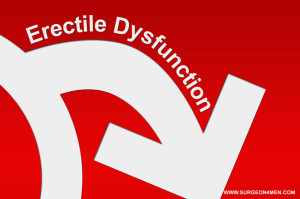Erectile Dysfunction and Age
Typically erectile dysfunction is associated with aging, but this isn’t the only factor that results in impotence or erection problems. In fact, urologists believe that physical factors are equally responsible for almost 90 percent of ED cases in men aged above 50. Though most cases of ED are associated with older men, aging doesn’t confirm that all men will experience impotence after a certain age.
Impotence and Age
 Erectile dysfunction is a condition in which a man is unable to maintain or hold an erection for sexual satisfaction of both partners. With age, there is a drop in testosterone levels in the body, affecting a man’s ability to gain an erection adequate for intercourse. Testosterone is central in the sexual process, playing an important role in kindling the desire for sex and triggering an erection. However, this doesn’t mean that anyone with high testosterone cannot have erectile dysfunction. In fact, some men with perfectly balanced testosterone levels suffer from impotence. Thus boosting testosterone isn’t the universal solution to ED.
Erectile dysfunction is a condition in which a man is unable to maintain or hold an erection for sexual satisfaction of both partners. With age, there is a drop in testosterone levels in the body, affecting a man’s ability to gain an erection adequate for intercourse. Testosterone is central in the sexual process, playing an important role in kindling the desire for sex and triggering an erection. However, this doesn’t mean that anyone with high testosterone cannot have erectile dysfunction. In fact, some men with perfectly balanced testosterone levels suffer from impotence. Thus boosting testosterone isn’t the universal solution to ED.
Besides, structural changes in the body with age could also be blamed for erection problems in men. Any damage to blood vessels that carry blood to the penis could result in erectile dysfunction.
With age, the concentration of smooth muscle and elastic fibers is adversely affected, which causes erection problems. As you age, blood vessels may degenerate, thus blocking the supply of blood needed for penile erection.
A 2003 research report conducted to find a connection between erectile dysfunction and aging revealed that ED is more common with aged men compared to younger males. According to the report, 2% of the surveyed men realized ED symptoms before 40 years of age, while 40% experienced reduced sexual function between 60 and 69 years of age. Another factor that may contribute to erectile dysfunction is age-related disease.
Chronic Disease in Older Men Could Cause Erection Problems
 A chronic disease in older men could cause erection problems, which may include:
A chronic disease in older men could cause erection problems, which may include:
- High blood pressure
- Diabetes
- Nerve damage
- Thyroid problems
- Blood vessel damage
- Kidney issues
- Pelvic trauma
Researchers found that older men are more at the risk of Peyronie’s disease, a condition in which scar tissue causes erection problems. Contraction of penile muscles doesn’t allow free flow of blood to the penis, resulting in a flaccid, un-erect penis. However, older men with a healthy lifestyle and no chronic illness have a lower risk of erectile dysfunction.
Other Causes of ED
Certain medical conditions can also cause erectile dysfunction. The condition may affect 1 in 4 men under 40 years of age and 70 percent of those about 70 years of age, according to Cleveland Clinic. The risk of erection problems increases with age but there are other factors that affect erectile function in men of all ages, including alcohol abuse, thyroid, physical activity, stress, fatigue, and smoking.
With several factors contributing to erectile dysfunction, it cannot be considered an inevitable consequence of aging. Though erectile dysfunction and age may seem related, ED cannot be considered a byproduct of aging, as there are men above 80 years of age who are sexually active and lead a healthy lifestyle.

